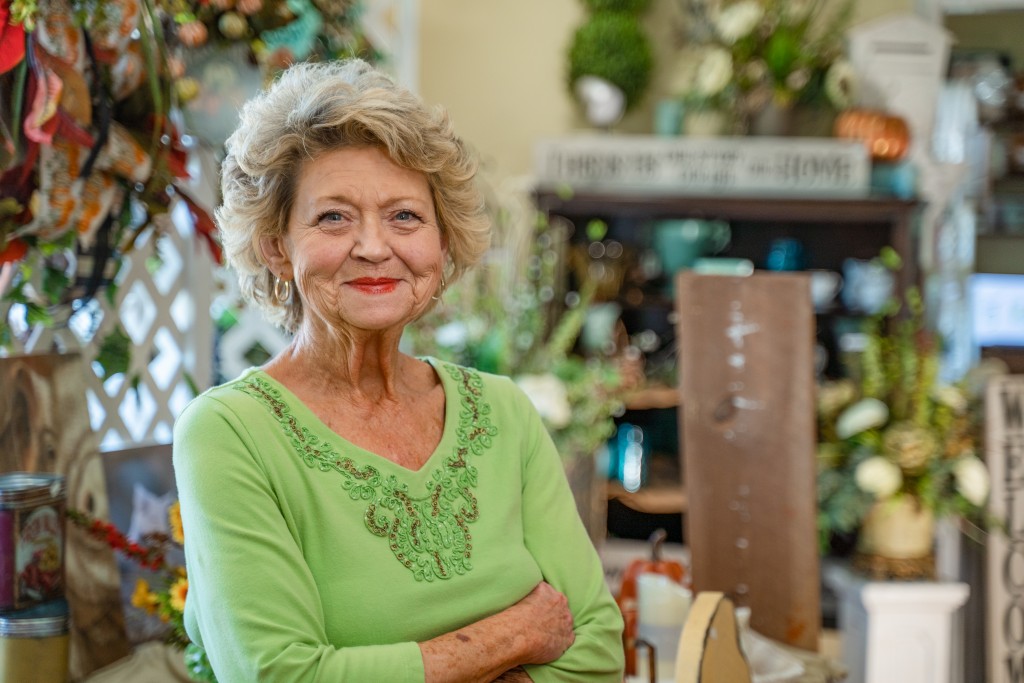News
Lebanon Florist’s Life Blooms After Surgery | Linda's Story
September 20, 2021
Lebanon native Linda Nally always dreamed of owning her own floral design shop but when she started experiencing gastrointestinal issues that stumped area physicians, she thought she might have to walk away from her life-long passion.
“It’s been a dream of mine to have a florist shop since I was probably about 17. I’ve lived in Lebanon all my life and owned Loper Floral since 2000 when we were in the location on Spalding Avenue. It’s just a part of me, they [the flowers] make me smile and make other people happy. There are so many different meanings with flowers for people.”
Aside from having her appendix out, Linda, now 72, had remained in great health until 2019 when she started experiencing recurring stomach pain, an inability to eat solid food, and routinely had to visit the hospital to have her stomach pumped or to have pain medication administered. Not only was her health suffering, but the business she had built and cared so much about was suffering as well.
“I’d have to call the girls in the morning and say ‘I’m so weak, I can’t get up’ and so the girls would have to carry my load during the day when I had been sick all night. It left me drained. So every week and a half or so, I was losing two days of work. As a small business owner, you have to be there,” she said.
Linda shared that she sought treatment from specialists in Lexington, Danville, and Louisville before meeting Dr. David Faber while hospitalized at Spring View during a particularly painful gastrointestinal episode in early 2021. Dr. Faber, a board certified general surgeon with over twenty years of experience had just joined the medical staff at Spring View the December before.
“I had been to see five different doctors,” Linda explains. “They kept running x-rays and scans and scopes. I even had a pain pump put in so I wouldn’t have to take narcotic drugs. He [Dr. Faber] said, ‘Do you mind if I take one more CT scan?’ and I said, of course not. I’d had so many, one more wasn’t going to hurt, but I wondered why they needed another one. In a couple of hours he came back and said “I see what’s wrong. You have a blockage and you’ve got loops in your intestines.’”
An answer for her ailment
Linda describes the overwhelming relief she felt when Dr. Faber shared her diagnosis. In addition to her intestines looping, he was also able to identify scar tissue in the lower right hand side of her stomach that had been causing her so much distress for so long.
The small bowel, also known as the small intestines, is about 25 feet long and approximately one inch in diameter. Nutrients, vitamins, minerals and water are absorbed by its lining – but in Linda’s case – she had barely been getting enough of these and had lost 60 pounds since her symptoms had begun.
“I didn’t immediately go to surgery. I begged off for a couple of weeks because Valentine’s Day was coming and I didn’t want to leave everyone without flowers,” Linda says, laughing at herself. “They scheduled me the day after – February 15.”
Dr. Faber estimates that an intestinal adhesion, or band of scar tissue, may have formed after Linda’s appendix surgery when she was just nine years old and progressively gotten worse over time. Sometimes abdominal adhesions can bind to the intestines making them twist or loop, similar to how a garden hose can become kinked, causing severe abdominal pain, nausea, and vomiting. Abdominal surgeries are one of the leading risk factors for small bowel obstructions, causing tissue in the small bowel to stick together, when normally it would just move freely.
In many cases, doctors avoid surgery for adhesions because surgery can often just create more adhesions, but for Linda, the scar tissue was causing her chronic symptoms and pain, so surgical removal of it was her only option.
“Linda’s case was unique in that previous physicians weren’t able to locate the source of her gastrointestinal problem. Sometimes scar tissue won’t show up on a CT scan,” Dr. David Faber offers. “I’m so glad we were able to identify the source of Ms. Nally’s discomfort and work to correct it so that she could return to leading a happy, and hopefully pain free, life.”
Safe, quality care despite COVID
Because Linda had surgery in the midst of the coronavirus pandemic, additional measures were taken to ensure her safety as well as that of her care team.
“I was uncomfortable at first, but I was so sick that it didn’t matter as much,” Linda observed about being hospitalized during the pandemic. “Everything at Spring View was so well orchestrated. The way they were being protective of themselves and me, as a patient. They were clothed in gowns and masks and gloves and when we [the hospital] didn’t have a COVID case, they would let me come out and walk in the hall to get my exercise.”
In the hospital for a full seven days post-operation, Linda slowly tested out liquids and then soft foods before finally enjoying some regular whole fruit for the first time in nearly two years. She has remained a patient of Dr. Faber’s since her operation for follow up care and dietary advice.
Linda’s voice is thoughtful and bright when she describes how her mother and her aunt instilled in her a passion for flowers: “I think they [the flowers] are kind of God’s gift given to me,” she says. She uses the same words when describing her experience: “I was just about ready to give up. The good Lord sent Dr. Faber to me. He’s just so experienced and knowledgeable and we’re so fortunate to have him at Spring View. I’m just so proud that we do. I want to tell everybody.”
